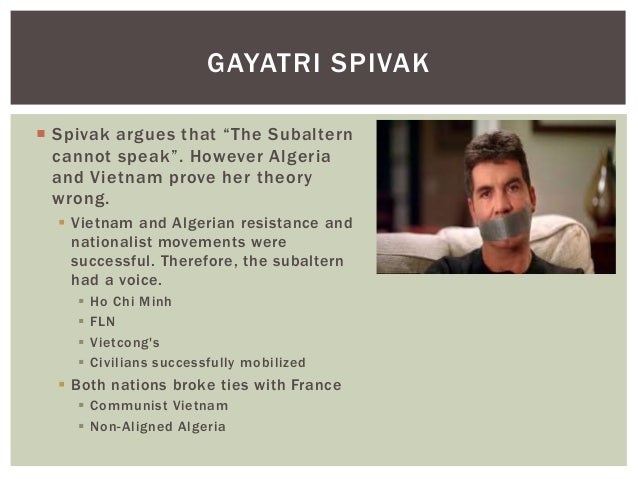Can The Subaltern Speak? Pdf
'Can the Subaltern Speak?' 'Can the Subaltern Speak?' , Brown UniversitySpivak's essay 'Can the Subaltern Speak?'

In 'Can the Subaltern Speak?' , Spivak offers the sentenc. Power of religion can be inferred, its practices supersede the maternal bond own fate; that, contrary to Spivak's argument, the subaltern can indeed speak. Can the Subaltern Speak Summary. Truth Construction. Spivak uses deconstruction to examine how true is constructed. She takes the example of Sati. Sati was a practice among the Hindus in which a woman was burnt alive with the pyre of her dead husband. When the British came to India they outlawed this practice. Since its publication, 'Can the Subaltern Speak?' Has been cited, invoked, imitated, and critiqued. In these phenomenal essays, eight scholars take stock of the effects and response to Spivak's work. They begin by contextualizing the piece within the development of subaltern and postcolonial studies and the quest for human rights.
Subaltern Theory
-originally published in Cary Nelson and Lawrence Grossberg's Marxism and the Interpretation of Culture (1988)-perhaps best demonstrates her concern for the processes whereby postcolonial studies ironically reinscribe, co-opt, and rehearse neo-colonial imperatives of political domination, economic exploitation, and cultural erasure. In other words, is the post-colonial critic unknowingly complicit in the task of imperialism? Is 'post-colonialism' a specifically first-world, male, privileged, academic, institutionalized discourse that classifies and surveys the East in the same measure as the actual modes of colonial dominance it seeks to dismantle? According to Spivak, postcolonial studies must encourage that 'postcolonial intellectuals learn that their privilege is their loss' (Ashcroft. In 'Can the Subaltern Speak?' , Spivak encourages but also criticizes the efforts of the subaltern studies group, a project led by Ranajit Guha that has reappropriated Gramsci's term 'subaltern' (the economically dispossesed) in order to locate and re-establish a 'voice' or collective locus of agency in postcolonial India. Although Spivak acknowledges the 'epistemic violence' done upon Indian subalterns, she suggests that any attempt from the outside to ameliorate their condition by granting them collective speech invariably will encounter the following problems: 1) a logocentric assumption of cultural solidarity among a heterogeneous people, and 2) a dependence upon western intellectuals to 'speak for' the subaltern condition rather than allowing them to speak for themselves.
Can The Subaltern Speak Spivak
As Spivak argues, by speaking out and reclaiming a collective cultural identity, subalterns will in fact re-inscribe their subordinate position in society. The academic assumption of a subaltern collectivity becomes akin to an ethnocentric extension of Western logos-a totalizing, essentialist 'mythology' as Derrida might describe it-that doesn't account for the heterogeneity of the colonized body politic.